TRAVEL 2007
Although I am retired, my travel schedule does not seem to lighten up. For environmental
reasons I do not take vacations or travel long distances for pleasure. My chalet
meets my needs for a change of pace and a chance to get away from the
pressures of life. However I still do fly for professional reason or where I
can be of service. I prefer to take the train where that is practical within
Europe, and only use my car for rural destinations that public transport
does not reach.
NEW CALEDONIA
The French Institut de Recherche pour le Développement (IRD, formerly
ORSTOM) invited me to be the scientific adviser to a new research project on
land-based impacts on coral reefs, part of a new research programme on Coral
Reef Initiative in the South Pacific (CRISP). I therefore traveled in April
to Noumea, New Caledonia, with other scientists including my old friend and
island specialist (nissologue) Christian Depraetere, for a meeting to plan
the research programme. It was the first time in more than a decade that I
had returned to Noumea where I lived from 1974 to 1985, where I met my wife
and where my children were born. I was able to meet many old friends, to
give some talks for the Baha'i community, and to lecture at the University
of New Caledonia.
The city of Noumea as developed a great deal since we lived there, with
buildings climbing up the hills, high-rise hotels and apartment blocks which
were rare before, and whole new districts that did not exist 20 years ago.
Even the road system had so changed that I had difficulty finding my way
around outside of the downtown area.
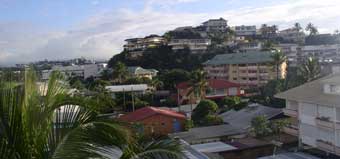
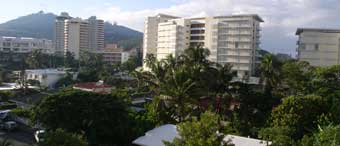
While the beach at Ansa Vata, where I used to work, is much the same, the
Secretariat of the Pacific Commission (SPC) has a new modern building
complex across from the beach.
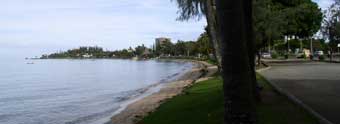
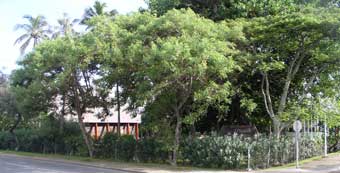
The old SPC site now has new high-rise buildings on it. My office used to be
where the building is behind the tree in the photo below on the left. This
is a big change from the single story wooden buildings with corrugated iron
roofs that the U.S. Army had left after World War II. Only the coconut palms
and the base of the old flagpole remain.
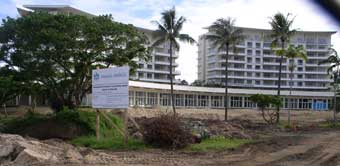
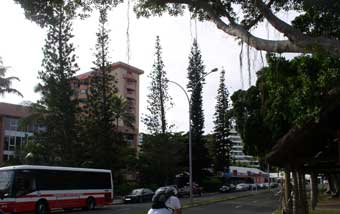
GANAGOBIE, FRANCE
The monks of the Benedictine Monastery at Ganagobie, in the south of France,
organize an inter-faith seminar each year. Since this year the theme was the
protection of the creation, the Baha'is of France asked me to represent them
at the seminar, so I traveled to Ganagobie in June. We lived in the
monastery with the monks, ate in silence in the refectory, and attended
early morning mass (for the first time in my life). The gregorian chanting
was beautiful, but the number of monks has diminished by half since they
moved from Hautcombe in Savoie some 20 years ago, and it would seem that
this ancient way of life may soon die out.
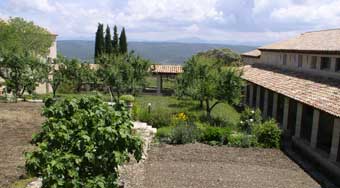
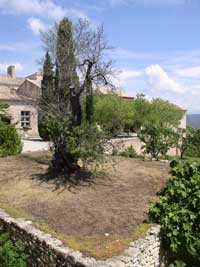 old
olive tree
old
olive tree
Ganagobie Monastery garden
The monastery is isolated on a high plateau with slopes that drop steeply to
the river valleys below.
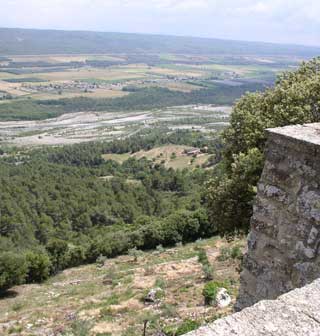
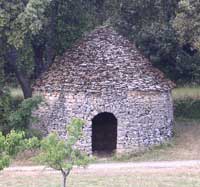 hut on monastery grounds
hut on monastery grounds
The ancient Romanesque church and cloister are at the heart of monastic
life.
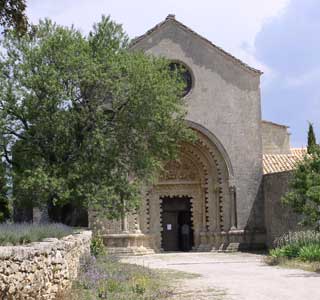
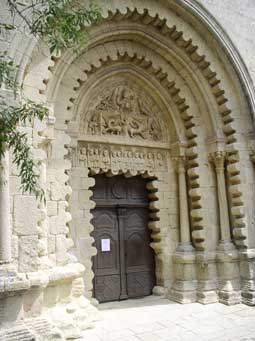
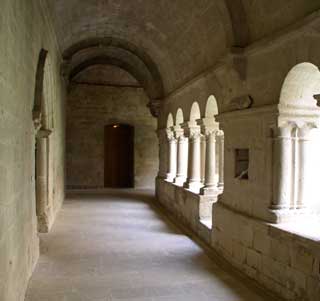
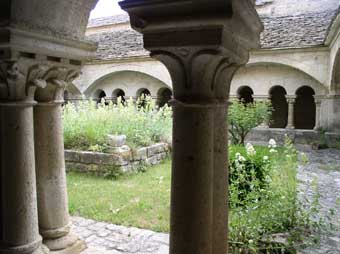
The church interior is very simple except for the beautiful ancient mosaics
discovered around the altar.
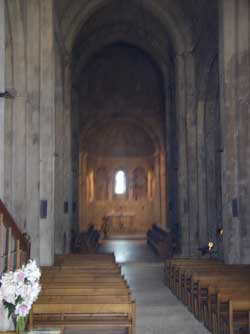
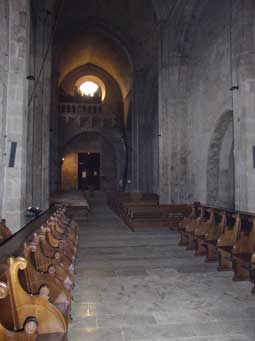 the monks sit facing each other
the monks sit facing each other
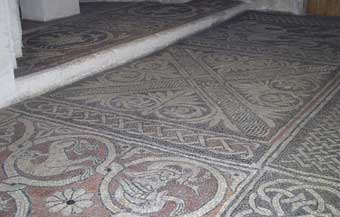
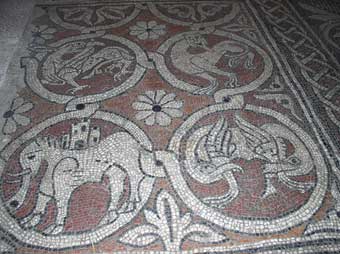
ancient mosaic floor
SAVOIE, FRANCE
My old friend George Starcher, President of the European Baha'i Business
Forum who lives in Chambery, Savoie, near where we used to live in St.Pierre
d'Albigny, loves trekking in the mountains in all seasons, and organizes
walks with his friends a few times a year. I was able to join him in June,
to climb up towards Lac Noir. While George is 10 years older than I am, he
still outdoes everyone. This is where I feel my age and my creaking
articulations. While I managed to lead the group up, I was the slowest
coming down. With my knee and ankle problems, my doctor has said that I can
go up hill but not downhill, so I descend carefully with the help of two
walking sticks.
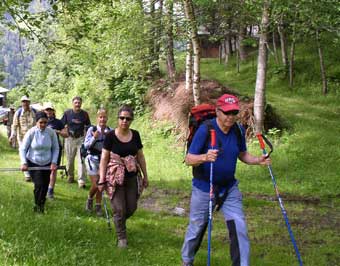
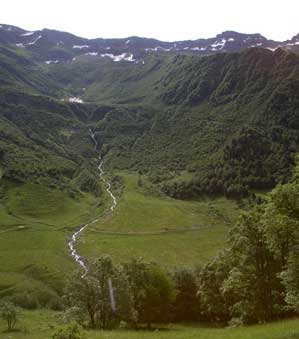
George Starcher leading the group
A long way down to
the valley
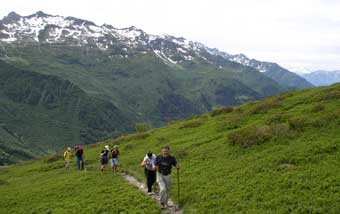
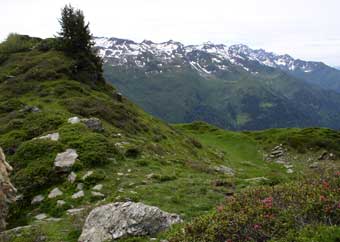
Alpine landscapes
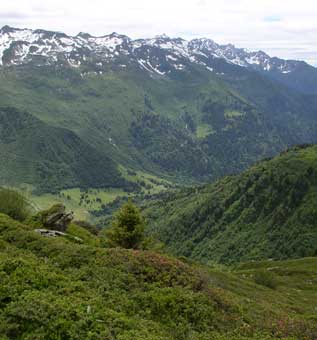
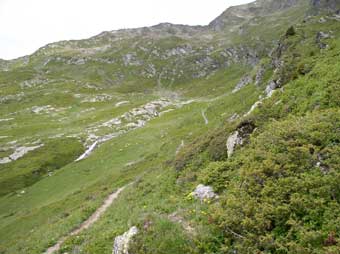
A carpet of wild azaleas on the mountainside The trail
up to Black Lake
BRITTANY, FRANCE
In July, we were able to have a family reunion. My son Alexander wanted his
wife Mahalia, stepson Jeremie and son Benjamin to meet his maternal
grandparents, who are getting along in years (my father-in-law is over 90).
We got them tickets to cross the Atlantic from Quebec, and my wife Martine,
daughter Agnes, sister-in-law Catherine (and a grandson) and I all gathered
at the Caillard residence in Plomodiern, Finistere, overlooking the Bay of
Douarnenez in the very west of Brittany.
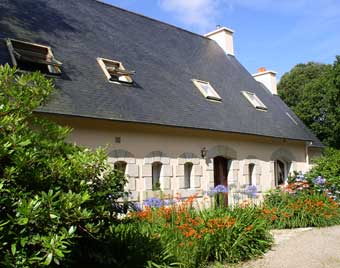
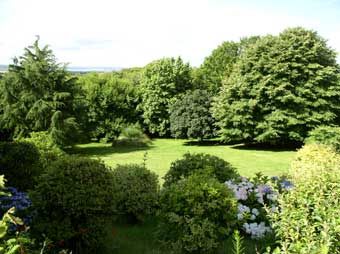
Caillard residence and its beautiful garden with the Bay of Douarnenez in
the distance
The house is not far from several beautiful beaches facing the Atlantic
Ocean.
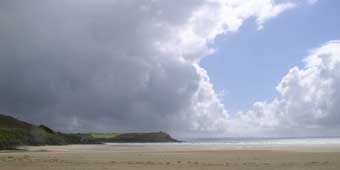
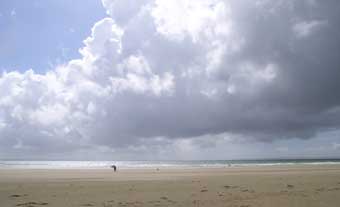
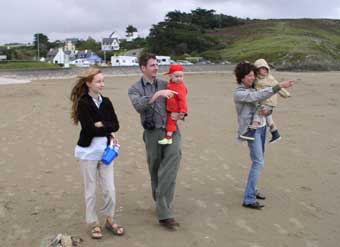 When the weather permitted, we went to the beach. Here are Mahalia and
Alexander with Benjamin, and my sister-in-law Catherine with her grandson
Sasha. The children loved to play in the sand.
When the weather permitted, we went to the beach. Here are Mahalia and
Alexander with Benjamin, and my sister-in-law Catherine with her grandson
Sasha. The children loved to play in the sand.
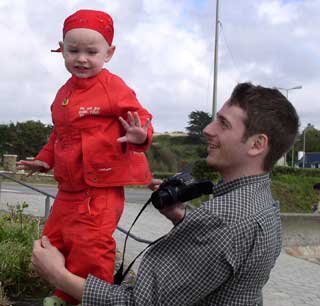 My
grandson Benjamin Gagnon-Dahl was the centre of attention and the subject of
multiple photographs, here with my son Alexander.
My
grandson Benjamin Gagnon-Dahl was the centre of attention and the subject of
multiple photographs, here with my son Alexander.
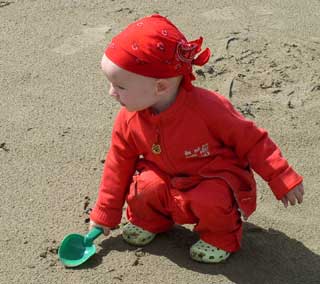
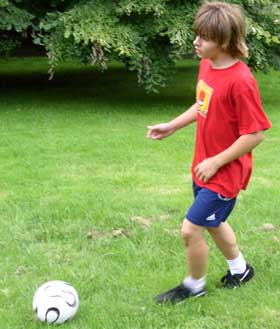
My step-grandson Jeremie, Alexander and two friends played football, which
is one of Jeremie's favourite activities. He returned to Quebec with a full
uniform of the French football team.
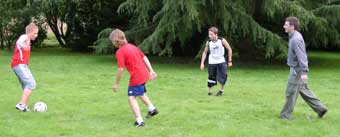
The children were fascinated by the electric train that we gave my
father-in-law many years ago when we moved to France from New Caledonia. We
also went to Oceanopolis in Brest, where Benjamin had a chance to discover
ice at the penguin exhibit.
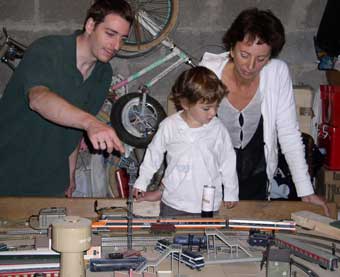
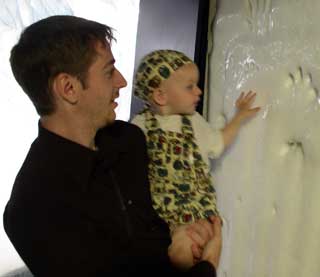
Another excursion was to the nearby city of Quimper, with its historic
centre and gothic cathedral. For Jeremie the Quebecois, it was a chance to
discover France and European culture.
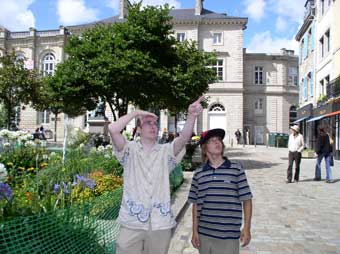
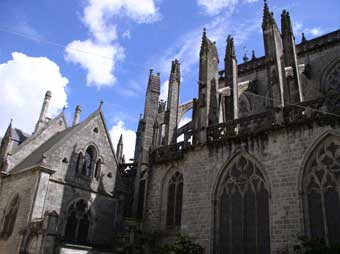
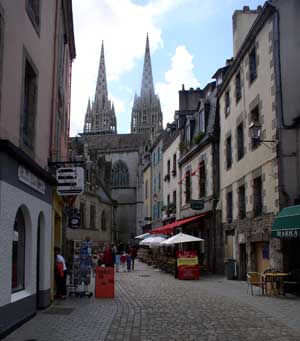
The living room was the place everyone gathered, and where my mother- and
father-in law, Francine and Claude Caillard, could be with the family.
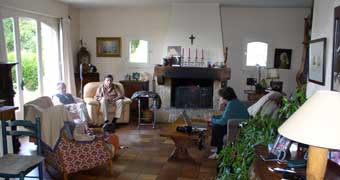
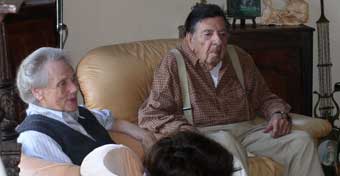
It was a rare chance for my wife Martine Caillard Dahl, children Agnes and
Alexander and I to be all together. Agnes' husband Bahador could
unfortunately not come.
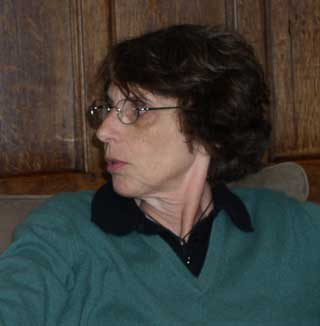
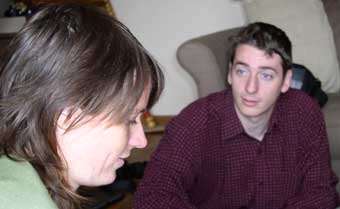
Agnes is a doctor in Geneva, Alexander an information systems architect in
Quebec.
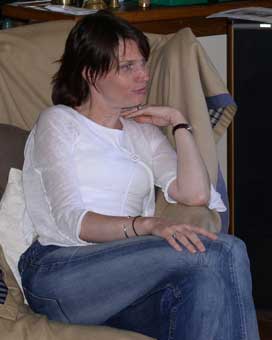
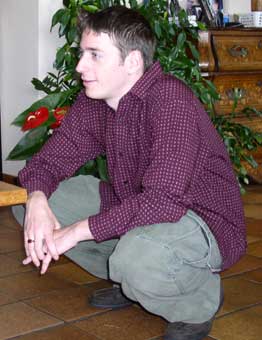
We strengthened family relationships and had a chance to dote on our
grandson
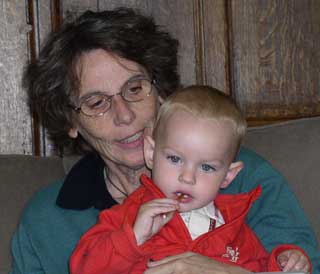
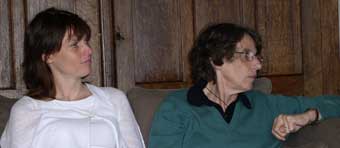
Benjamin loves trucks (camion = anything on four wheels), and especially to
ride on one in the garden.
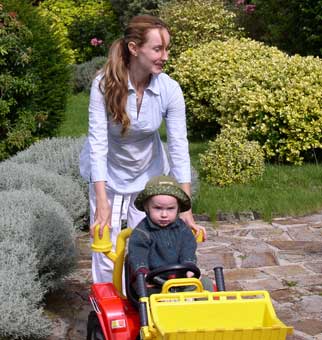
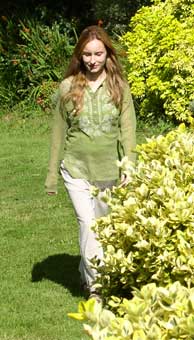 Mahalia in the garden
Mahalia in the garden
The next generation: Benjamin Gagnon-Dahl and Jéremie Gagnon
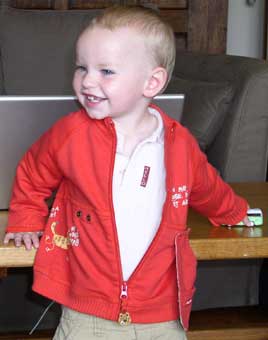 My grandchildren
My grandchildren 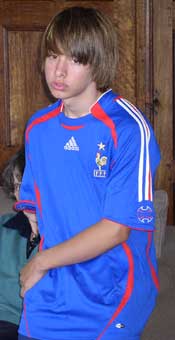
ST.SERNIN SUR
RANCE, FRANCE
I was invited to give some environmental talks at the French Baha'i summer
school, held this year in the village of St. Sernin sur Rance, in the
Aveyron in the southwest of France, in the facilities of an agricultural
school. In addition to the classes, I participated in two afternoon debates
with outside experts, one on climate change, energy and water problems, the
other on alternatives to globalization and the problems of agriculture,
particularly for small farmers.
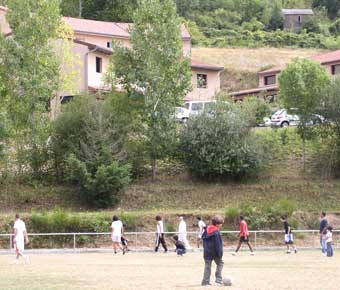 School dormitories and sports fields
School dormitories and sports fields
An orchestra with traditional instruments provide an opportunity for all the
generations to have a lively evening together.
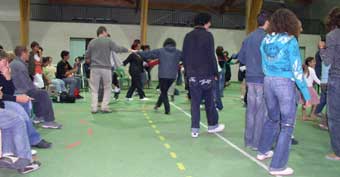
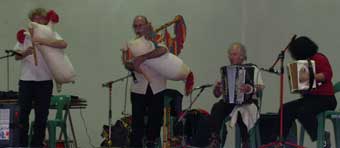
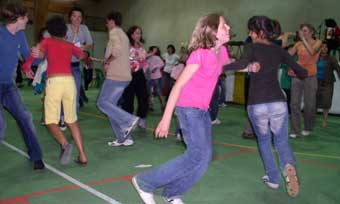
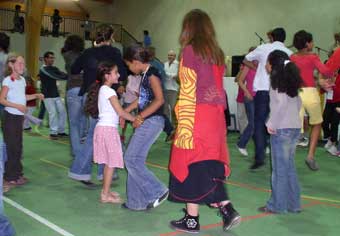
We were also able to walk into the perched village of St. Sernin sur Rance
for a festival with traditional music, and see a prehistoric menhir.
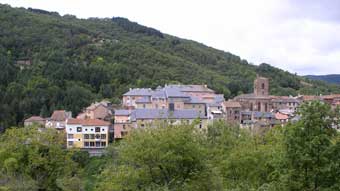
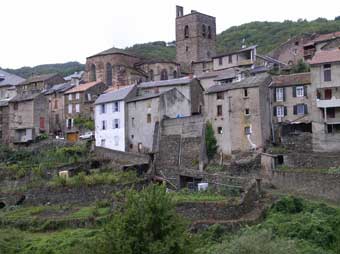
The menhir 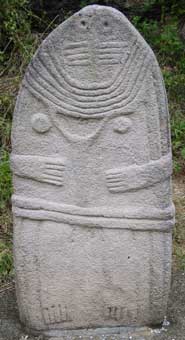
BULGARIA
At the end of August I went to Bulgaria to teach at their Baha'i summer
school, which was held in Balchik, on the Black Sea coast near the Romanian
border. We stayed a short walk from the beautiful summer palace and gardens
that Queen Marie of Romania, the first monarch to accept the Baha'i Faith,
built in the 1920s and 30s. We were able to have a special guided tour of
the palace and gardens.
BAHA'I
SUMMER SCHOOL
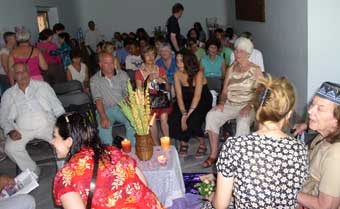
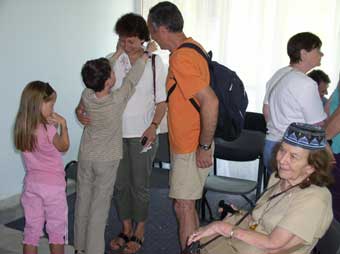
Participants in the Bulgarian Baha'i summer school, Lois Hainsworth in the
right foreground
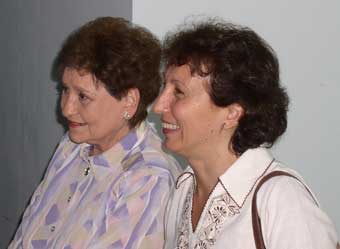 Terry
Madison, long-time pioneer to Sofia, and Auxiliary Board Member Emi Dahl, my
sister-in law
Terry
Madison, long-time pioneer to Sofia, and Auxiliary Board Member Emi Dahl, my
sister-in law
QUEEN
MARIE'S SUMMER PALACE IN BALCHIK
The visit to the royal palace in Balchik was a special occasion for the
large group of Baha'is and their friends. We were guided by Professor E.
Satchev who is a specialist on the palace and who explained how Queen Marie
incorporated many Baha'i ideas and principles into the design of the
buildings and gardens.
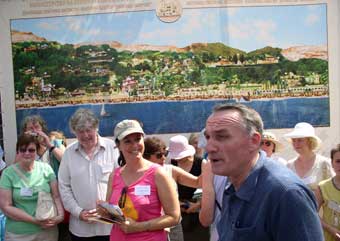
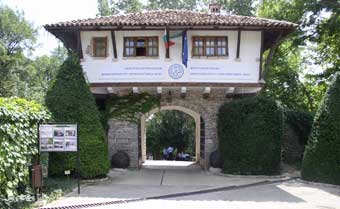
Prof. Satchev before a picture of the gardens
Palace entrance
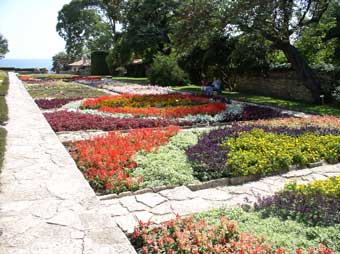
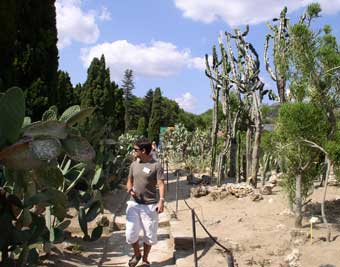
Flower and cactus gardens
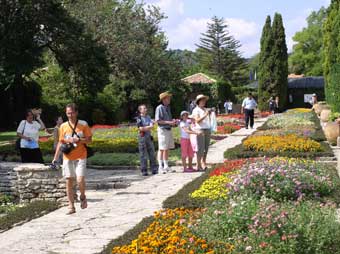
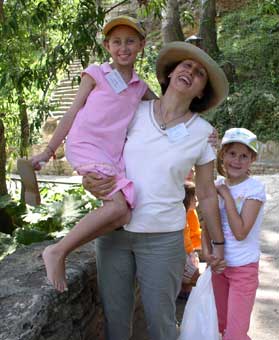
Among the visitors were my brother Greg, his Bulgarian wife Emi, and
Gregory, Joyce and Mina
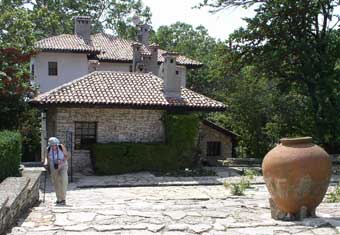
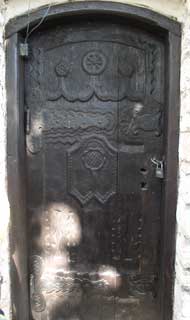
Queen Marie built a separate house for each member of her family in the
traditional style
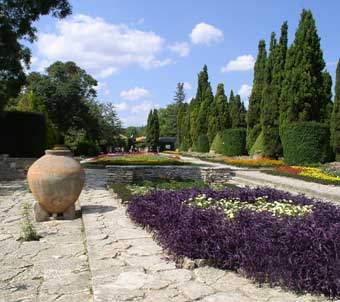
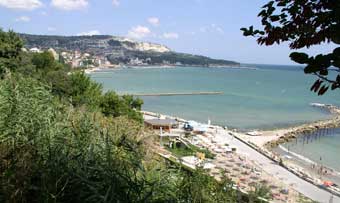
The gardens slope down to the beachfront, with paths joining the different
thematic gardens
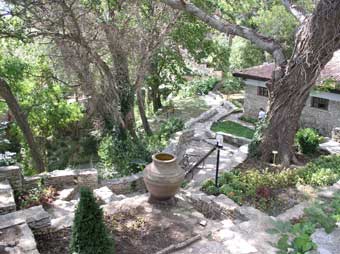
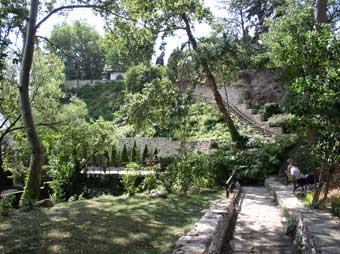
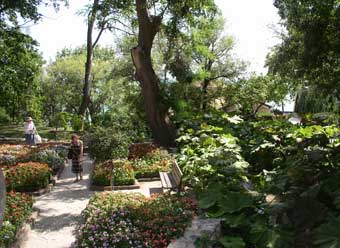
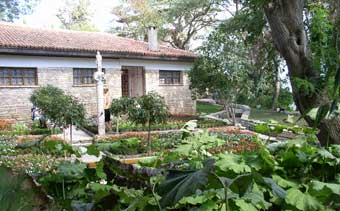
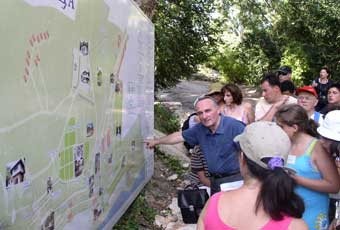 Professor
Satchev
explained each of the garden's features, representing different cultures and
religious traditions and demonstrating unity in diversity.
Professor
Satchev
explained each of the garden's features, representing different cultures and
religious traditions and demonstrating unity in diversity.
Map of the royal palace gardens
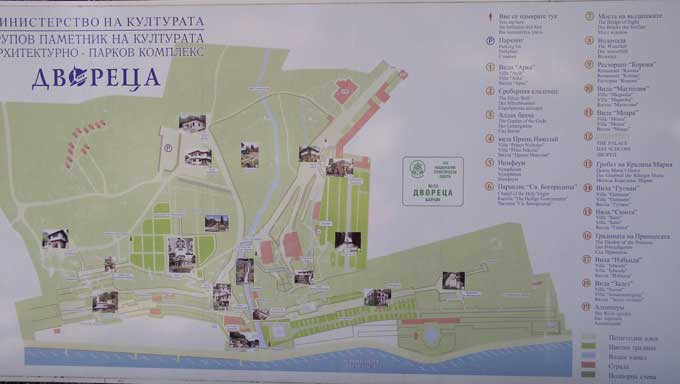
Flowing water is an important feature, with a waterfall and pools, and
channels throughout the gardens
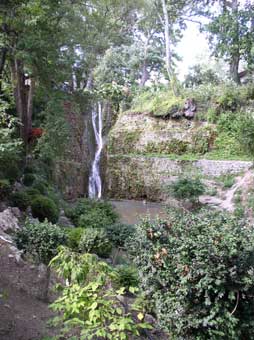
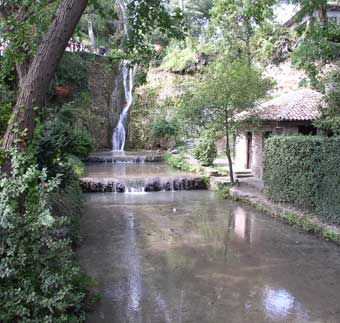
There is both formal and informal landscaping
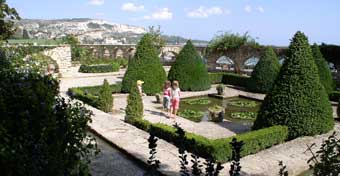
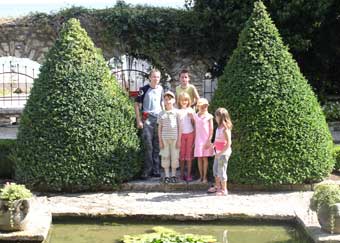
My nieces and nephew and their friends enjoyed the gardens
There is a formal English rose garden, and a corner dedicated to the Virgin
Mary where Queen Marie often came to pray
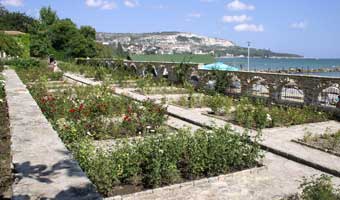
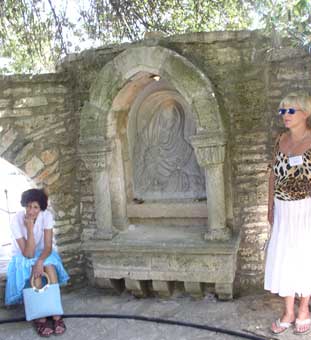
A part of the garden is modelled after Roman baths
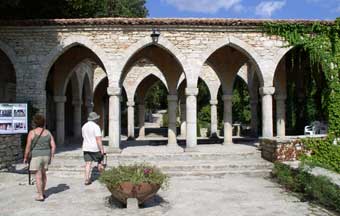
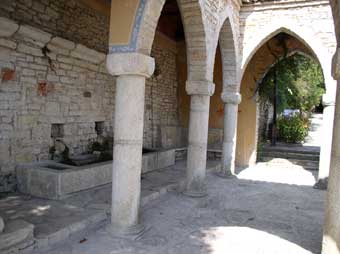
There were old water mills in the gardens, one of which Queen Marie
preserved. My nephew sat in a carved stone throne where Queen Marie often
sat to enjoy the view.
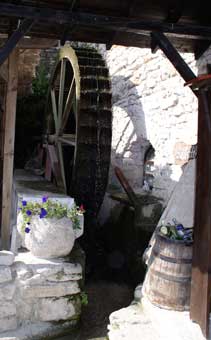
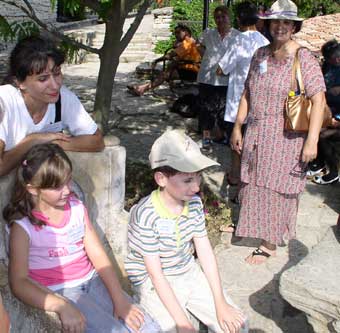
The gardens and Palace are just above the beach
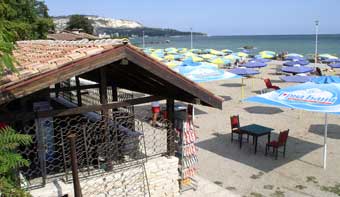
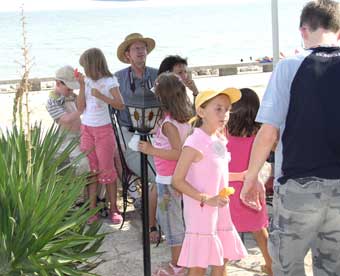
At the end of long arbor-covered walk paved in millstones, there is a niche
and millstone table where, according to Professor Satchev (but not other
sources), Queen Marie was tragically killed. She tried to intervene in an
argument between her two sons, and was accidentally shot through the heart
by her younger son.
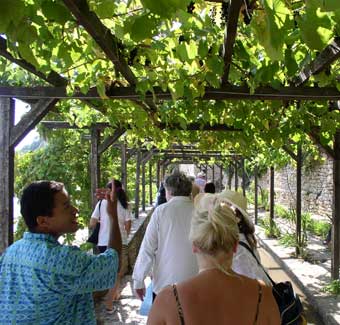
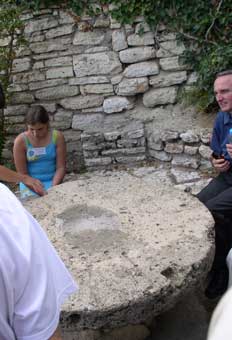
After her death, a chapel was built to house her heart, which she asked to
remain in her beloved Balchik when her body had to be buried next to her
husband the king in Bucharest. When Balchik became part of Bulgaria during
the war, her two sons came secretly by boat and took her heart back to
Bucharest, according to Professor Satchev.
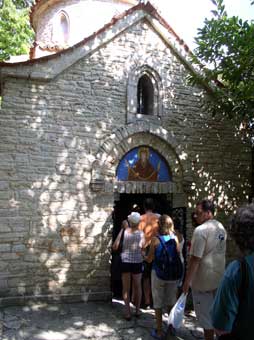
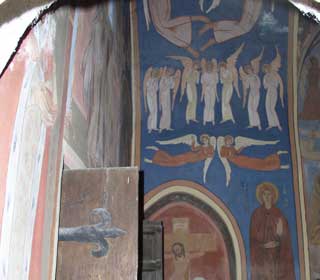
The Palace is surrounded by terraced gardens
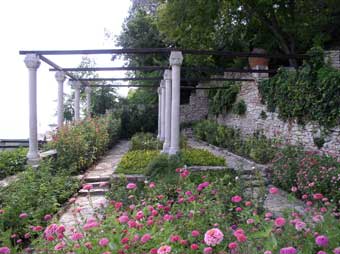
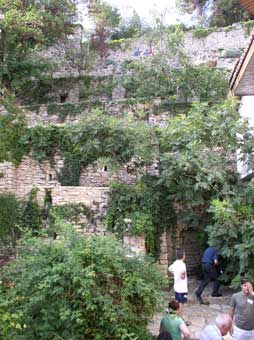
The Royal Palace combines Christian and Islamic architectural styles, with a
minaret-like tower.
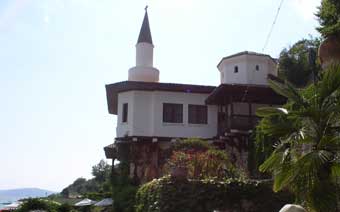
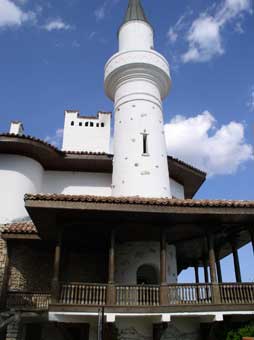
The interior is in simple good taste, and is now furnished with many
pictures of Queen Marie
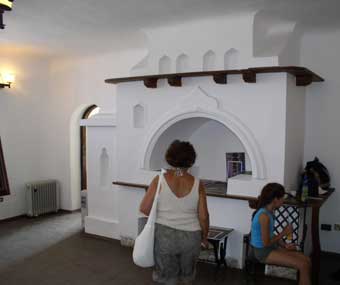
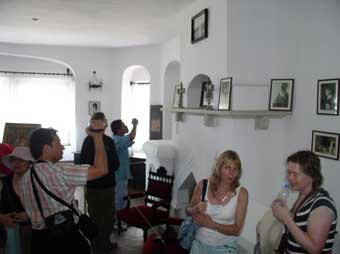
My nephew Gregory, like the other visitors, enjoyed the Palace, its views
and gardens
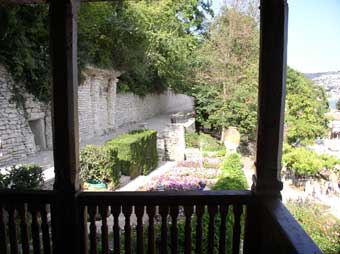
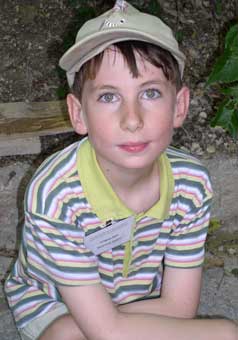
ALBENA
Another afternoon we went to a famous Black Sea beach at Albena, where the
children built a sand castle
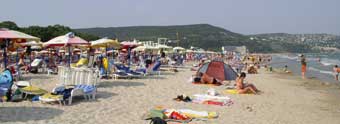
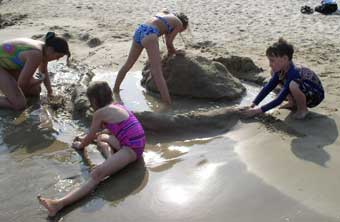
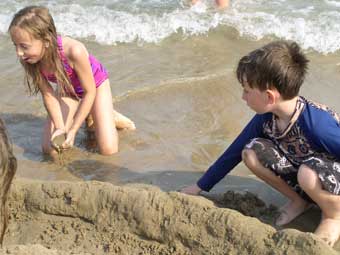
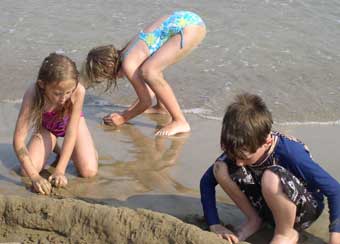
ZHERAVNA
Since we had to drive across Bulgaria from one end to the other, we stopped
overnight in the traditional Bulgarian village of Zheravna and stayed in a
300 year old house.
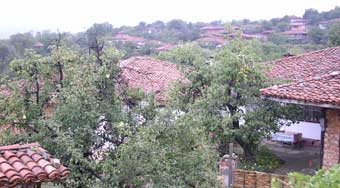
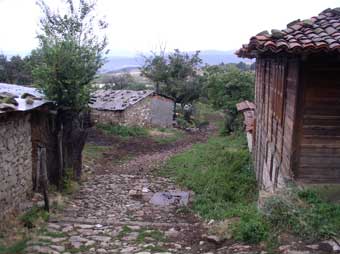
Rooftops of the village of Zheravna
a village
path between the houses
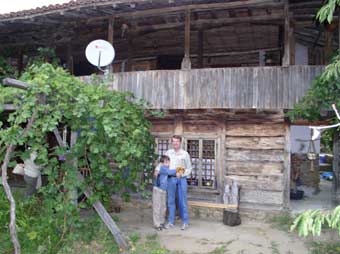
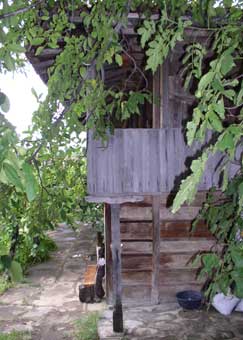
The 300 year old guest house where we stayed
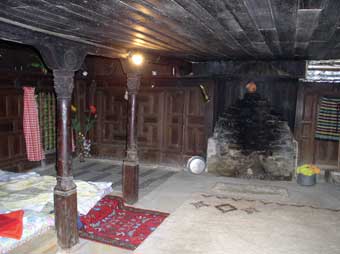
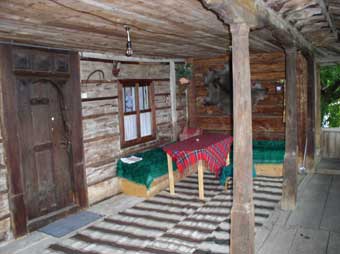
The interiors and porch have been restored in traditional fashion
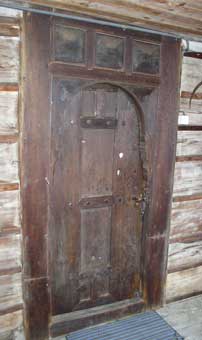
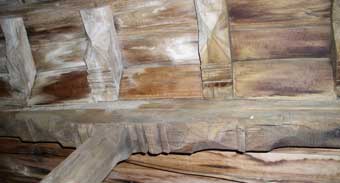
The doors, pillars and beams have all been decorated with carving in
traditional designs
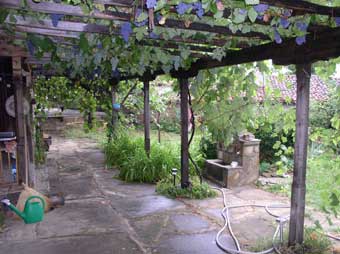
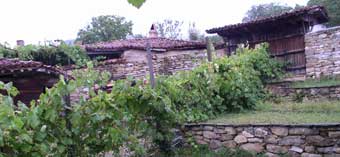
The arbor in front of the house was loaded with grapes. The garden was
enclosed with a wall and traditional gate, and included a well.
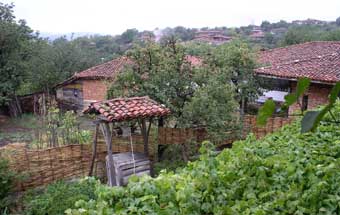
KRUPNIK
I stayed an extra week with my brother Greg and his family at their house in
Krupnik, the village south of Blagoevgrad where his wife Emi is from. Her
parents live next door and take care of the garden and orchard, ensuring a
constant supply of fruits and vegetables, and canning many things for the
winter.
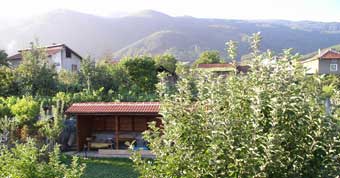
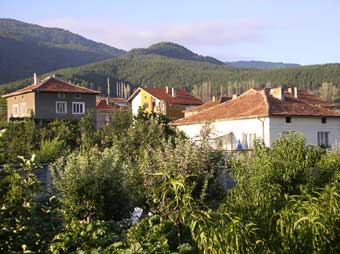
The village of Krupnik and the hills behind, from my brother's balcony.
Emi organized a Baha'i children's class for her children and their friends,
and Greg accompanied their singing.
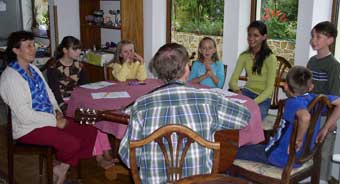
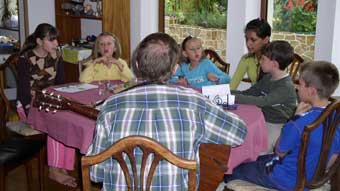
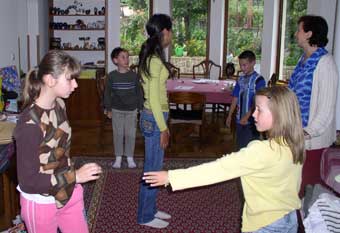
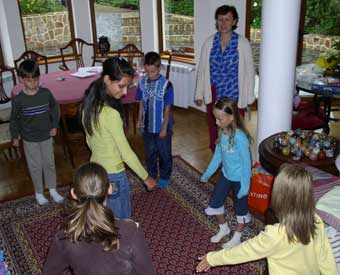
I returned to Bulgaria in November when my brother Roger was also visiting
my brother Greg and his family. One beautiful autumn day we went walking in
the hills behind the village of Krupnik with Greg's children Gregory, Joyce
and Mina.
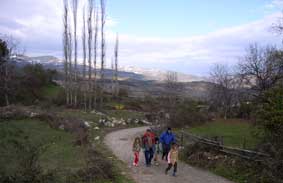
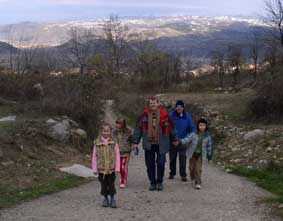
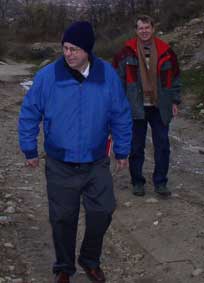
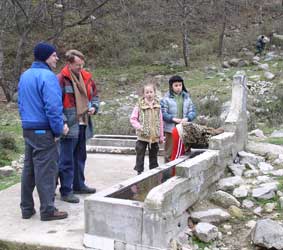
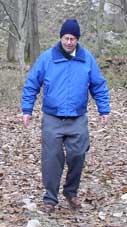
Roger and Greg
getting
water at a spring
A woodcutter came by with two horses to carry his wood down the mountain. He
gave the children a short ride on horseback.
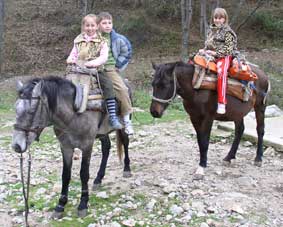
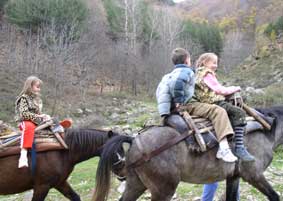
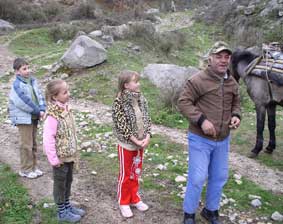
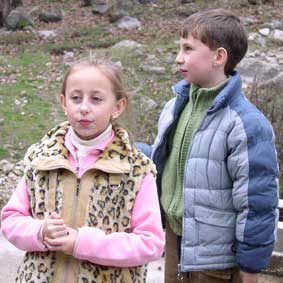
Gregory, Joyce and Mina with the woodcutter
the twins, Joyce and Gregory
CANADA
The International Environment Forum held its annual conference in Ottawa in
October, which also gave me an opportunity to visit my son Alexander and his
family in Quebec. For the IEF
conference, see its own page of photos: https://iefworld.org/conf11phot.htm.
After the conference, we went walking in a park near Ottawa to admire the
autumn colours.
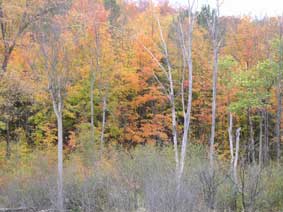
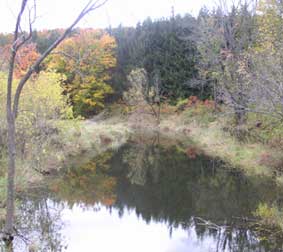
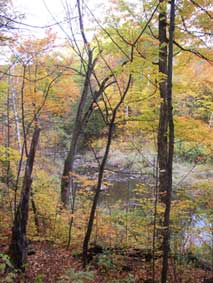 My grandson Benjamin
My grandson Benjamin 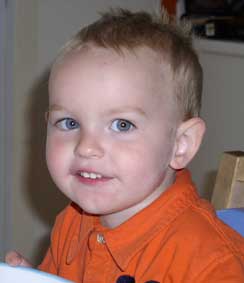
THE NETHERLANDS
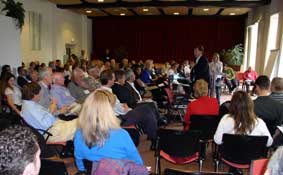 Each
year
the European Baha'i Business Forum (EBBF) holds its annual conference at the
dePoort conference centre in a forest near Nijmegen. Since I am a member of
the EBBF Governing Board, I usually go every year. The conference draws over
150 business leaders, students of business and others with a legitimate
interest in business to explore how ethical values inspired by the Baha'i
teaching can make business more responsible.
Each
year
the European Baha'i Business Forum (EBBF) holds its annual conference at the
dePoort conference centre in a forest near Nijmegen. Since I am a member of
the EBBF Governing Board, I usually go every year. The conference draws over
150 business leaders, students of business and others with a legitimate
interest in business to explore how ethical values inspired by the Baha'i
teaching can make business more responsible.
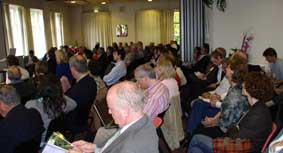
EBBF President George Starcher and
panel
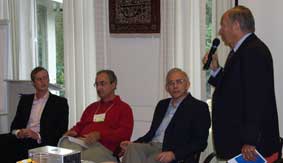 Some
of the principle EBBF leaders and speakers are shown here.
Some
of the principle EBBF leaders and speakers are shown here.
Secretary-General Daniel Truran
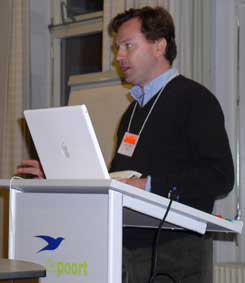
Wendi Momen
Beppe Robiati
Augusto Lopez Claros
Dorothy Marcic
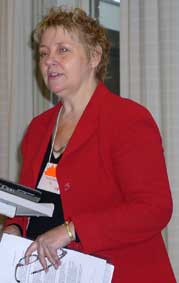
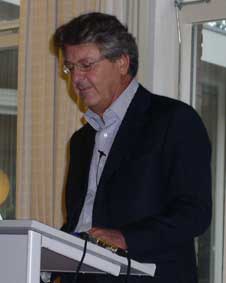
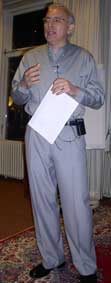
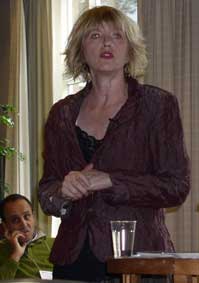
One feature of the conference is the presentation by AIESEC, the
international student organization with which EBBF has a close partnership.
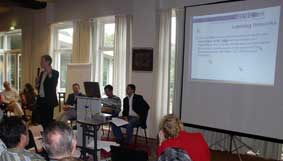







 old
olive tree
old
olive tree
 hut on monastery grounds
hut on monastery grounds




 the monks sit facing each other
the monks sit facing each other











 When the weather permitted, we went to the beach. Here are Mahalia and
Alexander with Benjamin, and my sister-in-law Catherine with her grandson
Sasha. The children loved to play in the sand.
When the weather permitted, we went to the beach. Here are Mahalia and
Alexander with Benjamin, and my sister-in-law Catherine with her grandson
Sasha. The children loved to play in the sand. My
grandson Benjamin Gagnon-Dahl was the centre of attention and the subject of
multiple photographs, here with my son Alexander.
My
grandson Benjamin Gagnon-Dahl was the centre of attention and the subject of
multiple photographs, here with my son Alexander.
















 Mahalia in the garden
Mahalia in the garden My grandchildren
My grandchildren 
 School dormitories and sports fields
School dormitories and sports fields








 Terry
Madison, long-time pioneer to Sofia, and Auxiliary Board Member Emi Dahl, my
sister-in law
Terry
Madison, long-time pioneer to Sofia, and Auxiliary Board Member Emi Dahl, my
sister-in law













 Professor
Satchev
explained each of the garden's features, representing different cultures and
religious traditions and demonstrating unity in diversity.
Professor
Satchev
explained each of the garden's features, representing different cultures and
religious traditions and demonstrating unity in diversity.
























































 My grandson Benjamin
My grandson Benjamin 
 Each
year
the European Baha'i Business Forum (EBBF) holds its annual conference at the
dePoort conference centre in a forest near Nijmegen. Since I am a member of
the EBBF Governing Board, I usually go every year. The conference draws over
150 business leaders, students of business and others with a legitimate
interest in business to explore how ethical values inspired by the Baha'i
teaching can make business more responsible.
Each
year
the European Baha'i Business Forum (EBBF) holds its annual conference at the
dePoort conference centre in a forest near Nijmegen. Since I am a member of
the EBBF Governing Board, I usually go every year. The conference draws over
150 business leaders, students of business and others with a legitimate
interest in business to explore how ethical values inspired by the Baha'i
teaching can make business more responsible. 
 Some
of the principle EBBF leaders and speakers are shown here.
Some
of the principle EBBF leaders and speakers are shown here.




